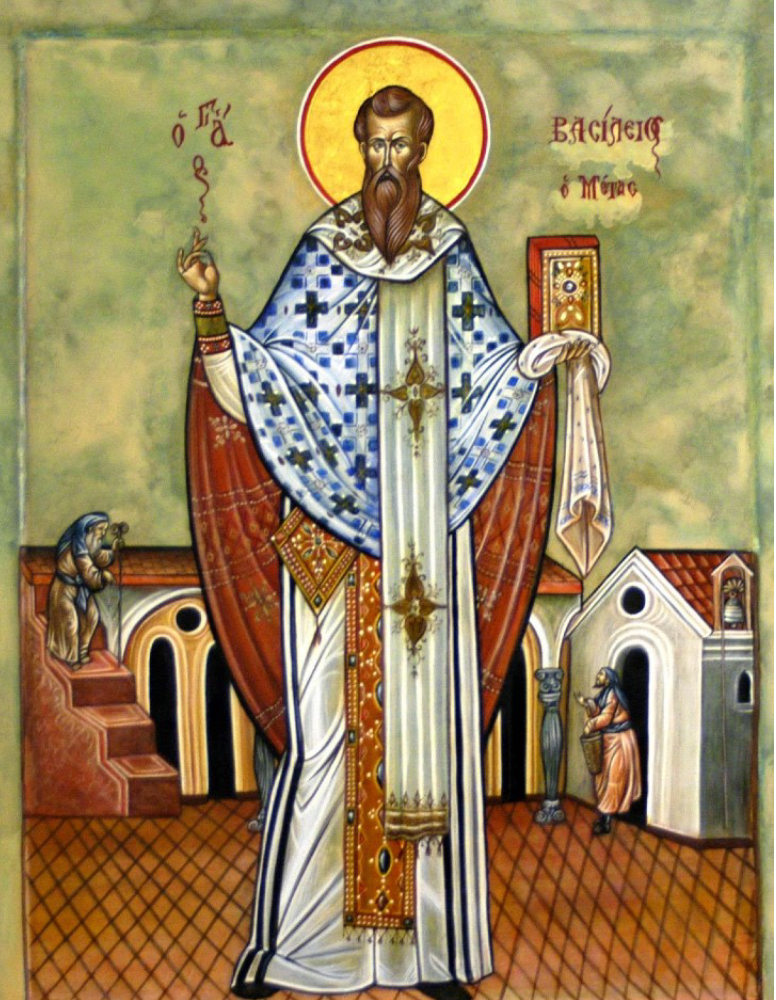The way in which each culture celebrates its holidays is reflective of its values and zeitgeist. While New Year’s Eve is a time for renewal, celebration, and community in many cultures, each country has a different flavor. America––true to its extravagance, commercialism, and celebrity culture––culminates yearly in the New York City Times Square celebration. While, undoubtedly, this night brings joy and new memories to many, there is also sense of separation from the depth of meaning our ancestors must have drawn from the entrance into and exit out of wintertime. Today, there is often a sense of opposition between one’s most intimate value system and the values perpetuated by the culture at large. To be bigger, faster, richer––these are the tenets that are promulgated and proselytized in the American mainstream. There is a need to externalize and glorify the loudest, least developed aspect of self––the parts that hunger for instant gratification and easy attention. We do not nurture those more ancient aspects of self that the silence and slowness of winter encourage: the beauty of a bare twig against a clouded sky, longer nights for reading and contemplation, less time out in the world and more time inside with loved ones. These are opportunities to develop community the way all of nature develops: in its own time, in earnest and quietness, in humor and in suffering. Winter is a time for clarifying, for reckoning, for deepening, to better recognize the depth of our souls and the souls surrounding us. The Blue Zone island of Ikaria knows this, and winter is just as much a celebrated and cherished time as its vibrant summer.
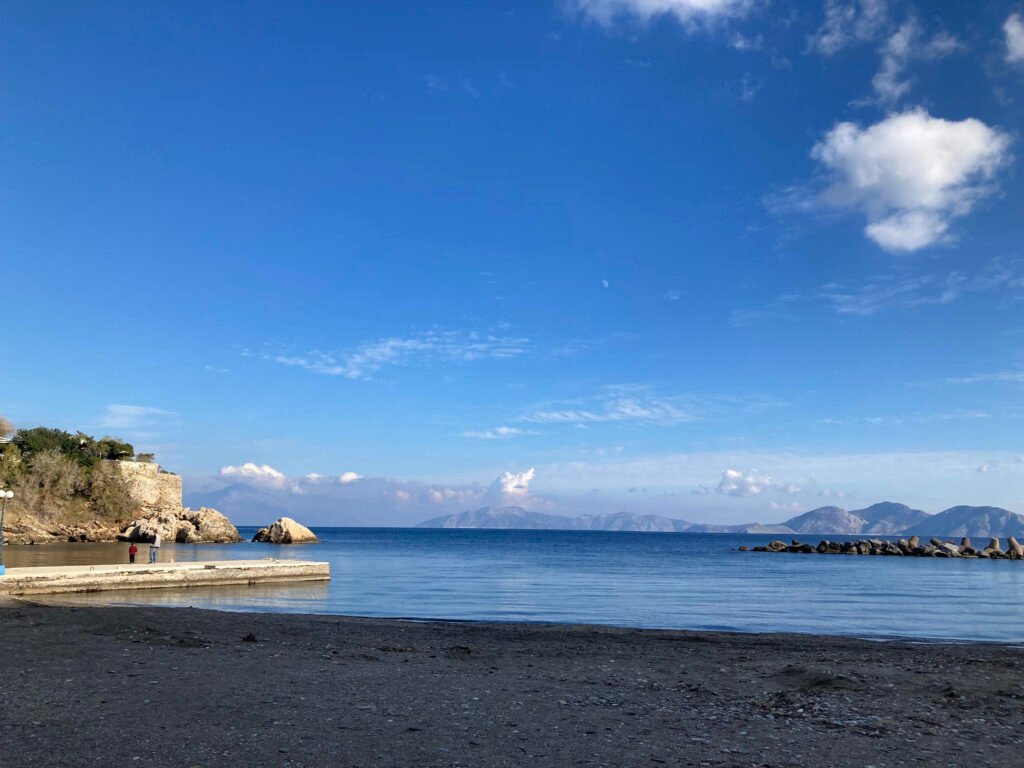
New Year’s Eve in the Blue Zone of Ikaria
These are the values heralded in the Blue Zone of Ikaria, whose New Year’s celebration synthesizes the wintery necessity of tight-knit community and togetherness with the excitement and passion of new beginnings. Necessity often breeds privilege, and what begins as pragmatic relations in order to survive daily life transforms into a mythical level of communion that breeds generations of centenarians. Humans are meant for simplicity; the natives of Ikaria are much happier sharing a homemade meal with their loved ones than eating a five-star meal alone, or in the company of people whose presence does not always afford true communion. This is similar to the difference between biodynamic Ikarian wines and the high-sulfur,
mechanized wines many Americans are used to drinking. When drinking these Ikarian wines, one feels and tastes the love, the generational wisdom, the ancient timelessness of these offerings.
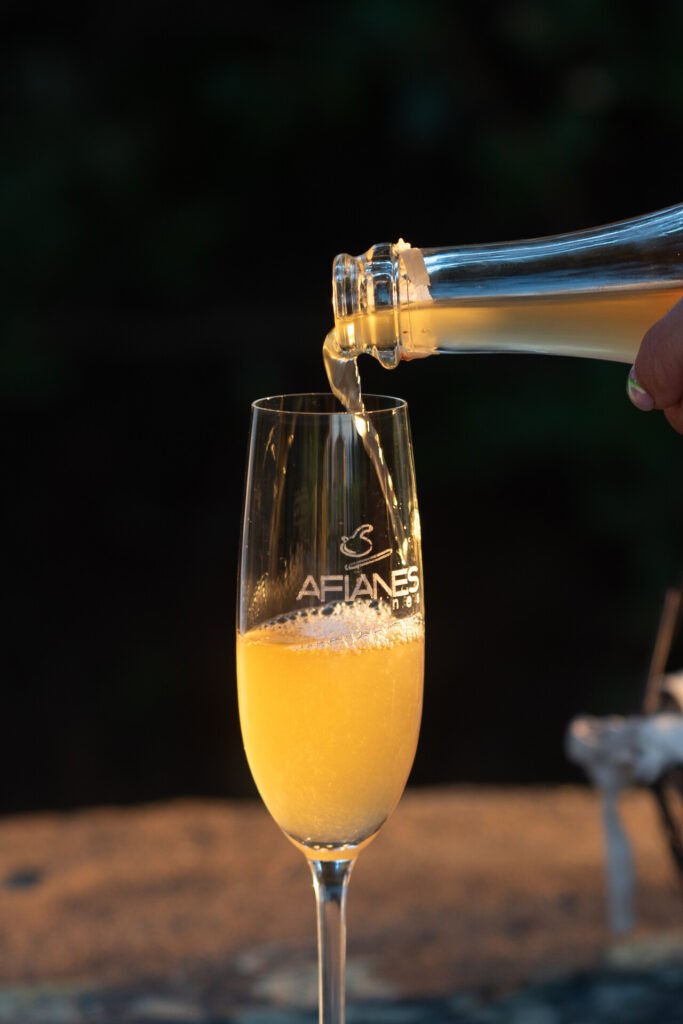
New Year’s Eve in the Blue Zone of Ikaria is no different than the magic of its wine. It is an experience unlike any other and is considered a high point of the year by its residents. Central to the Ikarian tradition is the generous hosting of neighbors and friends in a night-long celebration of delicious meals and desserts, Ikarian wine, dancing, caroling, traditional music, and all-around revelry. This is how a typical New Year’s celebration goes: each house spends days preparing their favorite traditional foods and preparing their rooms for the dozens of visitors they’ll have throughout the holiday. Once everything is prepared, neighbors journey from house to house all night long, spending from twenty minutes to a few hours in each house before moving onto the next, often walking in an ever-growing procession of people until every house has been christened by community. Sometimes the merry-goers are so numerous that not everyone can fit into the house, and people resort to partying outside. The exact procession differs from village to village, with some folks visiting only neighbors and close families, while other villages extend their welcome to acquaintances and strangers. This depends as well on how far the houses in each village are separated. Obviously, it’s easier to hit more houses in a compact village, while villages whose houses are separated by orchards or hills are more difficult to traverse.
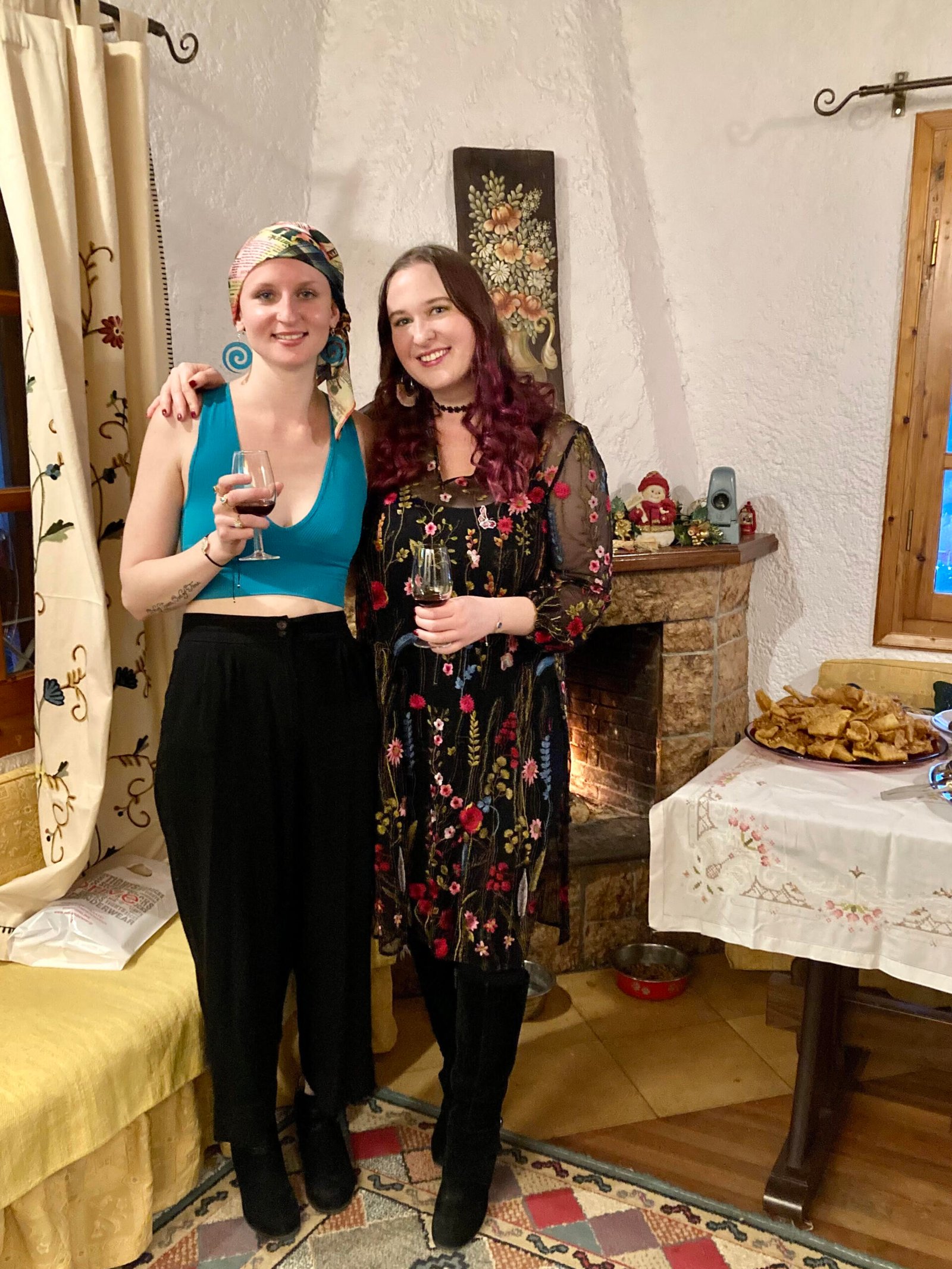
Each house is a fulcrum of joy and festivities, often overflowing with people. Traditional songs are sung all night long, usually accompanied by the violin or bouzouki. Songs often bestow blessings upon each member of the household, with the verses tailored to fit each household. Sharing in music is essential to the binding of the community, where these carols have been sung for generations, if not centuries or millennia. This level of comradery is exactly what makes Ikaria a Blue Zone, why there are so many nonagenarians and centenarians still vibrant enough to party all night long. They sing and dance beside the youngest members of their community. Three, four, or five generations share the same space, trading stories and laughter. This is longevity through love.
The Importance of Ikarian Wine and Traditional Food in Festivities
Delicious meals are shared, such as hortopita, which is layers of phyllo dough, leeks, chard, feta, spinach, and sesame seeds. Traditional stews are a winter staple as well, often made with pork, collards, and Ikarian wine. Winter soufico is a delicious dish made with pumpkin, dried chiles, and mint. Desserts are shared, such as honey dough puffs, honey cookies, cakes made with yogurt and lemon, dried fruits, and amygdaloto, which are cookies made with almonds and powdered sugar. Of course, Ikarian wine is a staple in these celebrations. Most families on the island make their own wine. This is shared in bounty, and because of its lower alcohol content, can be enjoyed plentifully all night long without causing a hangover the next day––all the reason more to drink!
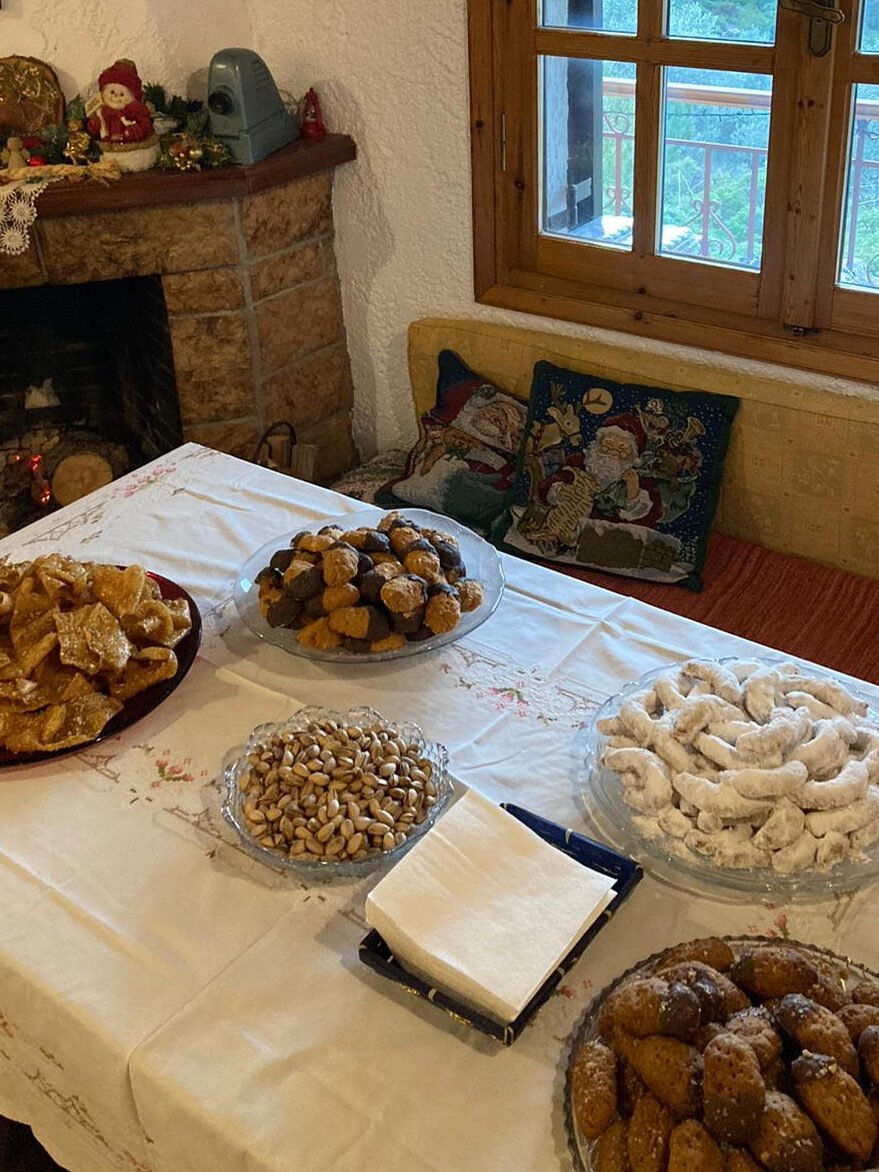
Special to the New Year’s tradition in Ikaria is the Kalanda, a traditional Greek carol sung most often by children. They go door to door, asking, “Na to poume?” which means, “Shall we sing?” The answer, of course, is always an enthusiastic “Yes!” The song praises the birth of Christ and bestows blessings upon the head of the household. After they sing, they’ll be given sweet treats and move onto the next home. This tradition is not far off from its ancient version, when children would carry small wooden boats and sing songs in praise of Dionysus.
Traditional Ikarian Dancing
Another custom central to the celebrations is the traditional dance of Ikaria, called Ikariotikos or Kariotikos, most often accompanied by the song “My love of Ikaria” by Giorgos Konitopoulos. The dance begins with everyone in a circle, arms on each other’s shoulders, beginning with simple steps and becoming increasingly complicated and faster until, as a foreigner, you feel like a total klutz and curse your inferior leg movements, which hitherto had only ever mastered the Cotton-Eye Joe. This dance is done at virtually every social gathering, from holidays to weddings to Friday-night outings.
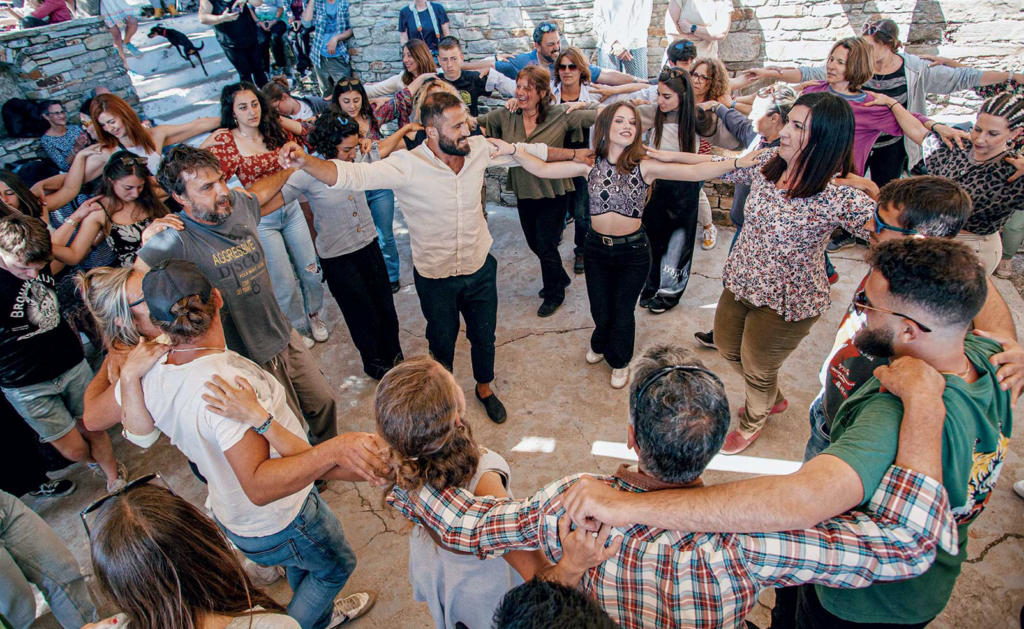
Ikaria’s Santa
The celebrations also incorporate the Greek version of St. Nicholas, known a Saint Basil, a 4th century Church Father who defended the Orthodox faith, an important figure in the culture, since most people in Greece are Greek Orthodox. Like St. Nick, St. Basil had a generous spirit and was known for leaving secret gifts to the poor and underprivileged. According to his myth, he found a way to bring justice back to the people after the emperor taxed them so excessively they were forced to hand over any gold and jewelry they owned. St. Basil pressured the emperor to cancel the tax, and afterward baked the jewelry into cakes and distributed them back to the people. This is the origin of the tradition of vasilopita, a thick and delicious cake with a buttery, citrus flavor. Nowadays, trinkets or coins are often placed inside. No matter what time of year, the charm of Ikaria pervades its wonder throughout every season.
